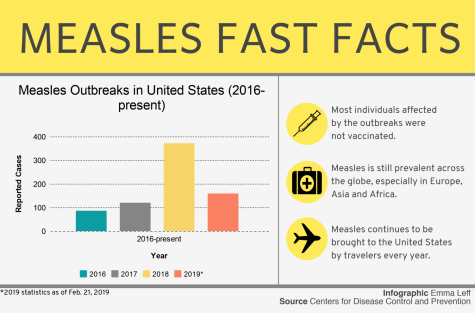Measles outbreak highlights dangerous anti-vaccination trend
Vaccines effectively protect against life-threatening diseases
March 4, 2019
In 2000, the United States was declared measles-free, yet there have already been over 120 confirmed cases in 2019 alone, according to the Centers for Disease Control and Prevention. It is not only irresponsible to not get basic immunizations, it endangers the lives of everyone nearby.
Many of these cases impact those who are unvaccinated. Measles is a highly contagious virus with no known cure, but the vaccine is 97 percent effective in just two doses. However, people continue to refuse to get this vaccination.
With the anti-vaccination community maintaining influence in not just America, but across the world, it is no surprise that the World Health Organization (WHO) named the refusal or hesitancy to vaccinate as one of the top ten threats to global health in 2019.
A main argument used in favor of not getting vaccinated is that the safety of vaccines is unknown. I understand why injecting a weakened or dead microorganism into your body can be alarming, but the top medical organizations in the world wouldn’t support vaccinations if they weren’t safe. According to the WHO, the chance of being seriously injured by a vaccine-preventable disease is far higher than being injured by a vaccine. In addition, the likelihood of having a major adverse reaction to a vaccine is very low.

People have the right to do what they want with their own bodies, but there is a limit when that individual freedom jeopardizes the safety of others. By choosing not to vaccinate, these people are allowing diseases that have largely been eliminated — predominantly thanks to immunization — to reemerge.
So whether or not you vaccinate might seem like an entirely personal choice, there are serious, larger ramifications. If the majority of a population is not vaccinated, the chance that one infection can lead to a full-blown outbreak increases. However, if enough people are vaccinated, infections can be isolated and treated accordingly. We can’t all just count on everyone else getting vaccines and assuming we will be safe. We all should be vaccinated.
The only exceptions I can see would be religious reasons and health concerns. Even in these cases, those people are giving up their right to intermingle with the public. Unvaccinated people do not have the right to put other people’s lives in danger.
While there is a risk to vaccines, there is a risk to all other medications. In this case, the reward of eliminating fatal diseases far outweighs the hazards associated with getting vaccinated. I’d much rather have a sore arm for a couple of days than die from a preventable disease.




